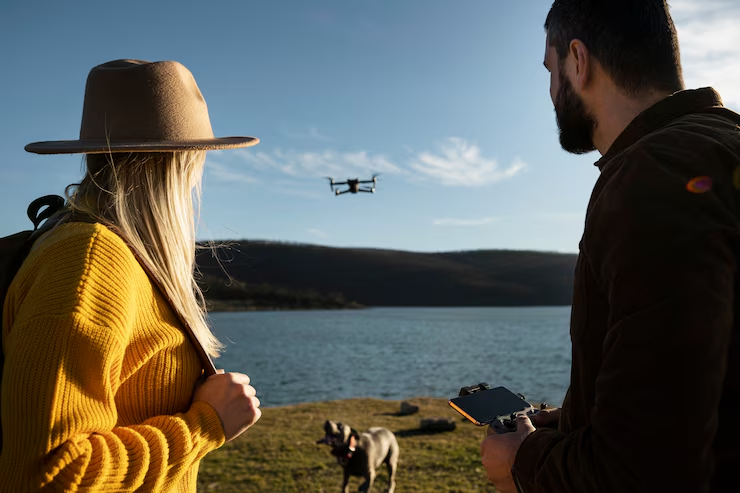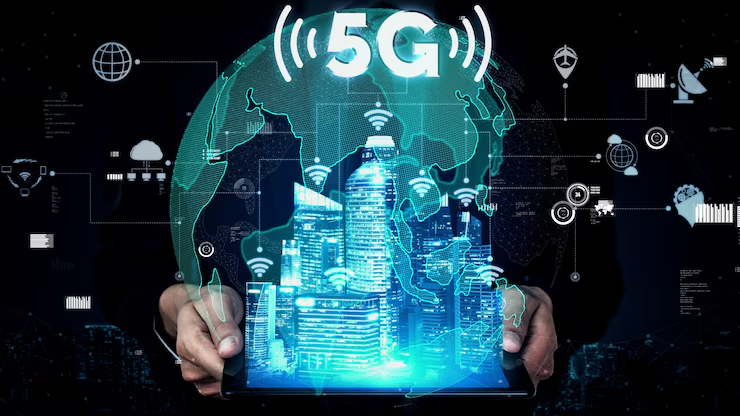Is There a License for Drones?

Drones have come a long way since their early days as military tools, evolving into versatile devices that are now used for various purposes such as recreational flying, aerial photography, surveying, mapping, delivering goods, and even monitoring wildlife. However, with this increasing use of drones has come the need for regulation and control, which has led to the question: Is there a license for drones is There a License for Drones?
In this article, we will explore the concept of drone licensing, the regulations that govern drone operations, the various categories of drone licenses available worldwide, and the legal and safety implications of flying a drone. Whether you are a hobbyist or looking to operate drones commercially, understanding the licensing requirements is crucial to ensure compliance and avoid penalties Is There a License for Drones?
The Rise of Drones
Drones, also known as Unmanned Aerial Vehicles (UAVs), were initially designed for military applications. They were used for surveillance, reconnaissance, and target practice in combat zones. Over time, however, drone technology became more accessible, and commercial applications began to emerge.
By the early 2000s, hobbyists were able to acquire drones that could be used for recreational purposes. This gave rise to a new market for drones, with manufacturers producing smaller, more affordable UAVs. Advances in technology and the integration of GPS, high-definition cameras, and sensors made drones appealing for a variety of industries, including agriculture, construction, real estate, cinematography, delivery services, and emergency response
As drone technology became more widespread, the potential for safety concerns and airspace management issues became apparent. This prompted government agencies around the world to step in and create regulations to manage the growing use of drones.
What Is Drone Licensing?

Drone licensing refers to the process of obtaining permission or certification to operate a drone, either for recreational or commercial purposes. The need for licensing arises from the fact that drones, especially those capable of flying at significant altitudes or carrying heavy payloads, can pose safety risks to other aircraft, people on the ground, and property. Licensing serves as a mechanism to ensure that drone operators are competent and adhere to established safety guidelines
Licensing requirements vary by country, but they generally include certain safety tests, registration of the drone, and adherence to specific operational restrictions. These regulations are designed to prevent accidents, promote safe drone operations, and ensure that the airspace is managed effectively.
Drone Registration vs. Drone Licensing

Before diving into the details of drone licensing, it is essential to clarify the distinction between drone registration and licensing.
-
Drone Registration: In many countries, drone owners are required to register their drones with the relevant aviation authority before they can fly them. This process helps authorities track drone operations and ensures that they can be held accountable in the event of an incident. For instance, in the United States, the Federal Aviation Administration (FAA) requires drones that weigh over 0.55 pounds (250 grams) to be registered
-
Drone Licensing: Licensing, on the other hand, pertains to the certification or qualification of the drone operator. Depending on the country and the intended use of the drone, operators may need to pass a written exam, complete practical flight training, and demonstrate proficiency in drone operations before they are granted a license.
While registration is mandatory for all drone owners, licensing is typically required only for commercial drone operators or those who intend to fly drones in certain restricted areas
The Need for Drone Licensing
Several factors contribute to the need for drone licensing. As drones become more prevalent in commercial applications, it is crucial to ensure that operators understand the risks associated with flying UAVs and have the necessary skills to operate them safely.
1. Safety Concerns
Drones have the potential to cause serious accidents if not operated correctly. Collisions with other aircraft, such as airplanes or helicopters, could result in catastrophic consequences. Furthermore, drones can pose a risk to people on the ground if they fall or malfunction mid-flight.
Drone licensing helps mitigate these risks by ensuring that operators are knowledgeable about safety protocols and are trained to handle emergency situations. Certified operators are more likely to adhere to safe flight practices, reducing the likelihood of accidents
2. Airspace Management
Drones share airspace with manned aircraft, including commercial airliners, private planes, and helicopters. It is vital to ensure that drones do not interfere with these aircraft, particularly in controlled airspace such as airports and busy flight corridors.
A licensing system ensures that operators understand the rules governing airspace usage and are familiar with restricted zones. This helps prevent drones from entering areas where they could pose a danger to manned aircraft
3. Liability and Accountability
In the event of a drone-related incident, licensing helps identify the operator responsible for the aircraft. This accountability is crucial for investigations and for determining liability. Licensing also ensures that operators are aware of their legal responsibilities and obligations, such as avoiding no-fly zones, respecting privacy rights, and adhering to height and weight restrictions.
Different Types of Drone Licenses
Drone licenses differ depending on the country and the purpose of drone operation. In most countries, commercial drone operators are required to obtain a license, while hobbyists may only need to register their drones. Below is an overview of the various types of drone licenses available around the world.
United States
In the United States, the Federal Aviation Administration (FAA) regulates drone operations. The two main types of drone licenses are:
-
Part 107 Remote Pilot Certificate: This license is required for commercial drone operators. To obtain this certificate, applicants must pass a knowledge test, which covers topics such as airspace regulations, weather, flight operations, and emergency procedures. Additionally, applicants must be at least 16 years old, be able to read, speak, write, and understand English, and be in good physical and mental health.
-
Recreational Drone Use: Hobbyists are not required to obtain a license, but they must register their drones if they weigh more than 0.55 pounds. They must also follow certain operational guidelines, such as flying below 400 feet, keeping the drone within visual line of sight, and not flying near airports or restricted airspace.
European Union
-
. Operators in this category must obtain a certificate of competence and must demonstrate their ability to operate the drone safely.
-
Certified Category: This category is for high-risk operations, such as flying drones with large payloads or flying over populated areas. Operators must have a certified remote pilot license and comply with strict operational procedures.
United Kingdom
In the United Kingdom, the Civil Aviation Authority (CAA) governs drone operations. There are two primary types of drone licenses:
-
Operator Registration: All drone operators must register their drones with the CAA if the drone weighs over 250 grams. This is similar to the registration requirement in other countries.
-
To obtain a PfCO, operators must undergo training and pass an exam that covers topics such as airspace regulations, safety, and risk assessment.
Australia
In Australia, the Civil Aviation Safety Authority (CASA) oversees drone regulations. There are two main types of drone licenses:
-
Recreational Use: Hobbyists do not need a license, but they must follow certain operational guidelines, such as flying below 120 meters and avoiding no-fly zones.
-
To obtain an RePL, operators must complete a training course and pass a practical flight test.
Canada
There are two main categories of drone licenses:
-
Basic Operations Certificate: This is for operators who fly drones for recreational purposes or under low-risk conditions.
The Process of Obtaining a Drone License
While the process for obtaining a drone license varies from country to country, it generally involves the following steps:
1. Training
Most countries require drone operators to complete a training program that covers topics such as flight operations, airspace regulations, weather patterns, and emergency procedures. .
2. Exams and Tests
Once the training is complete, candidates must pass a written exam that tests their knowledge of drone operations, safety protocols, and legal requirements.
3. Application and Certification
After passing the required exams, candidates can submit an application for certification. In most cases, this involves submitting identification documents, proof of training, and payment of any applicable fees. Once approved, the candidate will receive their drone license.
4. Renewal
Drone licenses are typically valid for a set period (e.g., three to five years). To continue operating legally, drone operators must renew their license by completing refresher courses, passing additional exams, and submitting updated paperwork.
Conclusion
In conclusion, there is indeed a license for drones, especially for those who intend to use drones for commercial purposes or in high-risk situations. Licensing helps ensure that drone operators are competent, knowledgeable, and capable of flying drones safely and responsibly. The process for obtaining a drone license varies by country, but it generally involves training, exams, and certification.
Whether you are a recreational flyer or a commercial drone operator, it is important to understand the legal and regulatory requirements for drone operation in your country. By obtaining the necessary license, you not only comply with the law but also contribute to the safety and efficiency of drone operations worldwide.



Nhờ giao diện hiện đại, bảo mật cao, cùng chiến lược toàn cầu hóa thông minh, xn88 game không chỉ nổi bật mà còn trở thành biểu tượng mới của sự đẳng cấp và an toàn trong ngành cá cược trực tuyến.
đăng ký 66b Nhà cái ghi điểm ở việc ứng dụng AI và Big Data để phân tích hành vi người chơi, từ đó tối ưu hóa giao diện và tính năng theo thói quen của từng thị trường.
888slot APP Một số trò chơi nổi bật tại nhà cái được cập nhật phải kể đến như Pubg, liên minh huyền thoại, CS:GO, FIFA, DOTA 2,….Mỗi trận đấu luôn được các chuyên gia nhà cái phân tích và đưa ra để anh em có cơ hội vào những kèo cược ngon, nâng cao cơ hội chiến thắng. TONY12-16
Yo, I would say bet88comvn is quite good, if not the best. I’ve been winning big in this platform. I would say I’d recommend this bet88comvn
Trong bài viết này, chúng ta sẽ khám phá chi tiết, từ các sản phẩm cá cược, chương trình khuyến mãi, đến lý do tại sao trở thành lựa chọn hàng đầu của người chơi tại Việt Nam. Chúng ta cũng sẽ tìm hiểu cách tham gia, mẹo chơi hiệu quả và các tính năng nổi bật khiến 888slot con nổi bật trên thị trường cá cược trực tuyến. TONY12-26
Nhắc đến sân chơi giải trí trực tuyến uy tín, không thể bỏ qua telegram 888slot . Nhà cái sở hữu kho trò chơi phong phú từ thể thao, casino live đến slot game hiện đại, tỷ lệ trả thưởng cạnh tranh, mang lại trải nghiệm cá cược mượt mà và minh bạch. TONY01-08
888SLOT sở hữu thư viện game bài đa dạng với hàng trăm lựa chọn, từ các game truyền thống đến phiên bản hiện đại. Dựa trên dữ liệu người chơi, ba thể loại được yêu thích nhất là Baccarat, Poker và Xóc đĩa. TONY01-29O